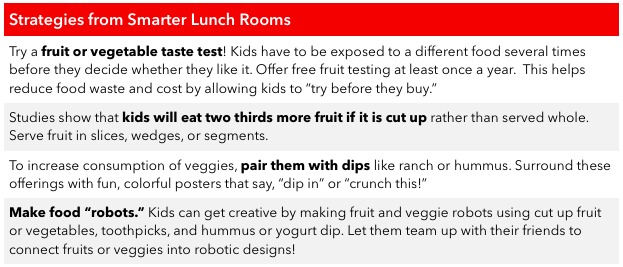Smarter Lunchrooms
If there’s one thing we could all use more of in our eating patterns, it’s produce. After all, plant-based diets have been linked with reductions in obesity, cancer, and heart disease. However, despite these myriad benefits, studies indicate that most people still aren’t getting enough produce.Getting kids to eat more fruits and vegetables can be especially challenging. Did you know that nine out of ten kids don’t eat enough vegetables? School cafeterias can be particularly difficult to navigate since kids are often offered as many unhealthful choices as healthful ones. Since over 30 million kids are nourished by the National School Lunch Program, school lunch offers an opportunity to make improvements to what children consume.A new program called the Smarter Lunchroom Scorecard has been designed to encourage students to choose and consume nutritious foods. The goal of the Smarter Lunchroom movement is to utilize research-based principles to guide children to make healthful food choices. The program is based on guidelines from The Cornell Center for Behavioral Economics in Child Nutrition Programs (B.E.N. Center), which has been studied and shown to be effective in a diverse range of schools across the United States.The Smarter Lunchroom Scorecard has 60 no cost or minimal cost action plans that can be used in lunch rooms to increase participation, increase healthful food consumption, and reduce food waste. The scorecard has been used by public health professionals and agencies such as SNAP, health departments, education departments, colleges, extension, and obesity prevention programs to evaluate improvements in the school nutrition arena.For more information and resources for the Smarter Lunchroom Scorecard, check out https://www.smarterlunchrooms.org. By Lisa Andrews, MEd, RD, LDReferences:
By Lisa Andrews, MEd, RD, LDReferences:
-
- Archer E., Hand G. A., Blair S. N. (2013). Validity of U.S. nutritional surveillance: National healthy and nutrition examination survey caloric energy intake data, 1971-2010. PLoS ONE. doi:10.1371/journal.pone.0076632
- Madden, Gregory and Price, Joseph, “Behavioral Economic Approaches to Influencing Children’s Dietary Decision Making at School”. Dec, 2016.
PDF Handout: Smarter Lunch RoomsSaveSaveSaveSave